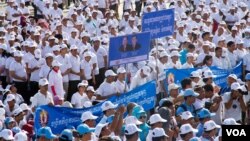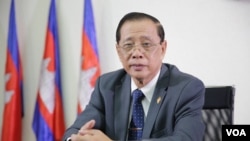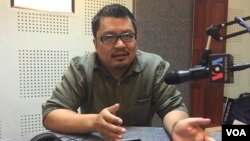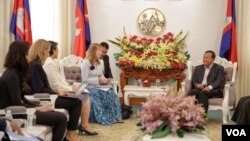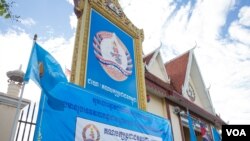The CPP has Phnom Penh on its mind.
In the run-up to commune elections on June 4, the ruling party has been busy promising residents of the capital to resolve long-running land disputes, award them land titles, and build them better roads. Prime Minister Hun Sen even announced this week he would join a pre-election parade and rally in Phnom Penh on June 2, marking the first time in nearly 20 years he has participated in outright election campaigning.
And CPP campaigners have been reminding city-dwellers that they owe improvements in urban infrastructure and quality of life directly to the ruling party. “People are living in happiness, both physically and mentally,” senior party administrator Say Chhum told thousands of attendees at a rally on the fast-growing Koh Pich island development to launch the party’s campaign in Phnom Penh.
But beneath the optimistic rhetoric lurks the fact that Phnom Penh has long been one of the CPP’s toughest electoral battlegrounds, voting against the ruling party in all but one national election since 1993.
Its best performance in the capital might have been the 2012 commune elections, when it won all 96 communes in Phnom Penh. But shortly afterward, the Sam Rainsy Party and the Human Rights Party merged to form the CNRP. The next year, the new party stunned the CPP in national elections. It also won 58% of total votes in Phnom Penh and claimed 7 of the capital’s 12 parliamentary seats.
Sok Eysan, a spokesman for the ruling party, acknowledged that the CPP was “put on alert” by its poor performance in Phnom Penh and other parts of the country in 2013, and considered the loss a rebuke by voters. Since then, he said, the party had been working to strengthen service provision in the capital and across the country.
But the problem may be deeper than that. One reason for the CPP’s struggles in Phnom Penh, analysts say, is that the capital is now home to the most sophisticated and educated population in the country, including growing numbers of young people who flock here to take advantage of education and work opportunities. Phnom Penh had 1.5 million residents as of the 2012 census, but it is growing so fast due to migration from the provinces that it is now believed to be around 3 million, according to Ou Virak, head of the Future Forum, a policy think tank in Phnom Penh. And urban and rural populations in Cambodia are fundamentally different.
“Whereas people in rural Cambodia tend to accept fatalistically decisions made by authorities, inhabitants of the capital more often do not accept misgovernment and a ruling party that is able to provide solutions for people’s small and big problems,” Markus Karbaum, a German political scientist specializing in Cambodian politics and economics, wrote in an email.
He noted that people in cities have easier access to information about the development projects and governance issues that affect their daily lives. But just as important, he said, was the fact that the CPP’s political power largely derives from mobilizing deep-rooted patronage networks that are more effective in rural areas than urban ones.
Because of this, he predicted that the CNRP would not only achieve a “landslide victory” in Phnom Penh, but also make significant inroads in other urbanizing areas of the country.
“In urban settlements the CPP’s strategies to exercise influence and control voters are much less pronounced than in rural areas,” he wrote. “When people are also self-confident and able to scrutinize autocratic leaders (due to an increased level of education), the probability that they vote for the CNRP is considerably high.”
But winning the growing capital, and finding a way to lure more sophisticated voters, will be crucial to the CPP in the future. The battle over the 105 commune chief and 899 commune councilor positions up for grabs in the June 4 election will be one of the first big tests of its appeal.
“There are a lot of reasons they are not doing well in Phnom Penh,” said Ou Virak. “One, the population of Phnom Penh, if you look at the demographics, many of them are actually wage earners—most of them are now in the middle-class, lower-middle-class income bracket… which means they have food on the table.
“When you have to put food on the table, your mind can’t wander outside that—food is all you can think about when you don’t have any—but when you do, there are so many things you can think about. This is a challenge for the CPP.”
Ou Virak noted that, for the first time in Cambodia’s history, the majority of the population—around 60%—were now wage earners rather than farmers, and had different concerns, including job creation and employment opportunities.
“The number of farmers is actually a lot less than 40 percent, and that is a new reality,” he said.
People inside the CPP seem aware that the stakes are high.
Municipal Governor Pa Socheatvong has recently touted a number of initiatives for urban beautification, including banning dogs from public parks, installing hundreds of CCTV cameras and removing ATMs from some public places. But his ideas have drawn widespread derision from Cambodians on social media, who have mocked his seeming obsession with minutiae.
Last month, his idea to remove all automotive garages was blasted by none other than Hun Sen’s sister, Hun Sinath, who wrote on her Facebook page that he was “burning votes” with the initiative. Mr. Hun Sen also stepped in to block the governor’s idea to improve traffic congestion in the capital by restricting car imports into Cambodia, writing on his own Facebook page that he would not agree to the proposal.
Pa Socheatvong declined a request for comment, saying any interview he gave about his work as governor would only be “complimenting myself” since it was contrary to human nature to be self-critical in public.
Several voters interviewed this week, however, were not entirely complimentary.
Hok Chhayleng, a 22-year-old engineering student, is a case in point. He said he had noticed and appreciated the transformation of the city over the past decade. But he also felt that leaders were not taking voters’ problems seriously.
“Sometimes it seems ridiculous, like they have a childish way of working. We face difficulties like congestion on our roads that remains unsolved, but he chose to address other problems, like wiping out ATMs and chasing dogs in public parks,” Hok Chhayleng said.
In his home commune of Teuk La’ak III, he said, local CPP officials were also unresponsive to constituents’ needs.
“They are unfriendly and unconcerned with our needs, and we often feel helpless.”
Preap Nart, 24, a student who lives in Stung Meanchey commune in the capital’s southwest, said he was also frustrated. Like the voters described by Karbaum, he is paying attention to national-level issues as well as local problems. He cited the 2015 beating of opposition lawmakers by pro-government thugs and the use of state-employed district security guards to disperse demonstrations in Phnom Penh, often violently.
“These are unacceptable. Although this is just a commune election, I am thinking of change,” he said.
Still, the CPP’s message is undoubtedly getting through to many. 45-year-old stone-carver Khun Visal said he was proud that the city looked like a powerful and wealthy capital, with tall buildings springing up across the skyline.
“Development is moving forward step by step, like this is an emerging country,” said Khun Visal, crediting the ruling party for the change.
Sok Eysan, the CPP spokesman, said he was confident that this message would resonate. He argued that if the CNRP performed well in Phnom Penh, it was due to people’s dissatisfaction with the CPP rather than any real strength of the opposition.
“We have already put in place the in-depth reforms to enhance quality of public service for the people, and the people are satisfied with the CPP, which has been honest in acknowledging that they had flaws in governance and improve them on time at people’s wishes,” he said.
But Morn Phalla, chief of the CNRP’s municipal executive committee, disagreed. He said the city’s population was highly receptive to the opposition’s call for change. He said the CNRP would improve services in the capital and eliminate the use of unpopular district security forces to police protests.
“People in Phnom Penh, who are educated, well-off, well-informed, analytical and wise, will continue to support and vote for the CNRP,” he said.




